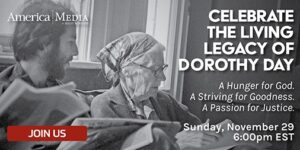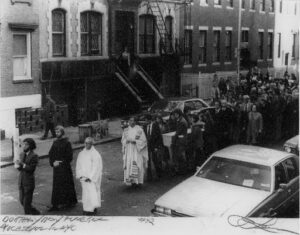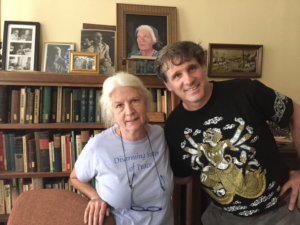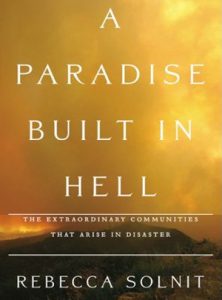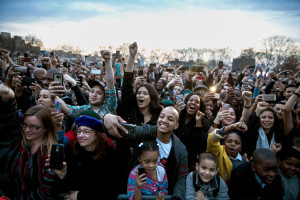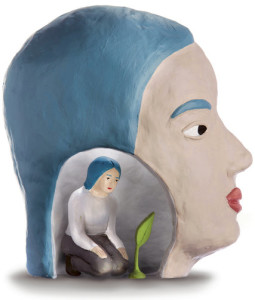David Brooks
The American Renaissance
June 17, 2021NYTimes
David Brooks
“In 1982, the economist Mancur Olson set out to explain a paradox. West Germany and Japan endured widespread devastation during World War II, yet in the years after the war both countries experienced miraculous economic growth. Britain, on the other hand, emerged victorious from the war, with its institutions more intact, and yet it immediately entered a period of slow economic growth that left it lagging other European democracies. What happened?
In his book “The Rise and Decline of Nations,” Olson concluded that Germany and Japan enjoyed explosive growth precisely because their old arrangements had been disrupted. The devastation itself, and the forces of American occupation and reconstruction, dislodged the interest groups that had held back innovation. The old patterns that stifled experimentation were swept away. The disruption opened space for something new.
Something similar may be happening today. Covid-19 has disrupted daily American life in a way few emergencies have before. But it has also shaken things up and cleared the way for an economic boom and social revival.
Millions of Americans endured grievous loss and anxiety during this pandemic, but many also used this time as a preparation period, so they could burst out of the gate when things opened up. After decades of slowing entrepreneurial dynamism, 4.4 million new businesses were started in 2020, by far a modern record. A report from Udemy, an online course provider, says that 38 percent of workers took some additional training during 2020, up from only 14 percent in 2019.
After decades in which consumption took preference over savings, Americans socked away trillions of dollars in 2020, reducing their debt burdens to lows not seen since 1980 and putting themselves in a position to spend lavishly as things open up.
The biggest shifts, though, may be mental. People have been reminded that life is short. For over a year, many experienced daily routines that were slower paced, more rooted, more domestic. Millions of Americans seem ready to change their lives to be more in touch with their values.
The economy has already taken off. Global economic growth is expected to be north of 6 percent this year, and strong growth is expected to last at least through 2022. In late April, Tom Gimbel, who runs the recruiting and staffing firm LaSalle Network, told The Times: “It’s the best job market I’ve seen in 25 years. We have 50 percent more openings now than we did pre-Covid.” Investors are pouring money into new ventures. During the first quarter of this year U.S. start-ups raised $69 billion, 41 percent more than the previous record, set in 2018.
Already, this era of new creation seems to be rebalancing society in at least three ways:
First, power has begun shifting from employers to workers. In March, U.S. manufacturing, for example, expanded at the fastest pace in nearly four decades. Companies are desperate for new workers. Between April 2020 and March 2021, the number of unemployed people per opening plummeted to 1.2 from 5.
Workers are in the driver’s seat, for now, and they know it. The “quit rate” — the number of workers who quit their jobs because they are confident they can get a better one — is at the highest in two decades. Employers are raising wages and benefits to try to lure workers back.
Second, there seems to be a rebalancing between cities and suburbs. Covid-19 accelerated trends that had been underway for a few years, with people moving out of big cities like New York and San Francisco to suburbs, and to rural places like Idaho and the Hudson Valley in New York. Many are moving to get work or because of economic distress, but others say they moved so they could have more space, lead slower-paced lives, be closer to family or interact more with their neighbors.
Finally, there seems to be a rebalancing between work and domestic life. Stanford economist Nicholas Bloom expects that even when the pandemic is over, the number of working days spent at home will increase to 20 percent from 5 percent in the prepandemic era.
While this has increased pressures on many women, millions of Americans who could work remotely found that they liked being home, dining every night with their kids, not hassling with the commute. We are apparently becoming a less work-obsessed and a more domestic society.
In 1910 the educator Henry Van Dyke wrote, “The Spirit of America is best known in Europe by one of its qualities — energy.” That energy seemed to be fading away in recent years, as Americans came to move less and start new businesses less frequently. But the challenge of Covid-19 has summoned forth great dynamism, movement and innovation. Labor productivity rates have surged upward recently.
Americans are searching for ways to make more money while living more connected lives. Joel Kotkin, a professor of urban studies at Chapman University, points out that as the U.S. population disperses, economic and cultural gaps between coastal cities and inland communities will most likely shrink. And, he says, as more and more immigrants settle in rural areas and small towns, their presence might reduce nativism and increase economic competitiveness.
People are shifting their personal lives to address common problems — loneliness and loss of community. Nobody knows where this national journey of discovery will take us, but the voyage has begun.”
The American Renaissance Has Begun
Dorothy Day.
November 23, 2020With author David Brooks & publisher Robert Ellsberg.
“In anticipation of our upcoming commemoration of the the 40th anniversary of Day’s death on November 29th 2020, we remember the eulogy given by Father Geoffrey B. Gneuhs, O.P. at the funeral of Dorothy Day, Nativity Church, New York City, December 2, 1980:”
In her book The Long Loneliness, Dorothy wrote, “All my life I have been haunted by God.” And where did this haunting God lead her? To a life of simplicity and poverty with the poor, to solidarity with the outcasts—today in this city of New York there are more and more people homeless as mental hospitals close and social services are cut back, while at the same time this country spends $170 billion a year for armaments.
This haunting God led Dorothy to jail because
she spoke and acted for the rights of women and men, of laborers and workers; she was led to jail because she stood with the farm workers, and to prison because she would not tolerate the militarist posture of this country. She was led ultimately to community, to love.
This being haunted by God became for her a stupendous and extraordinary pilgrimage, a pilgrimage of faith. For sure, the Sermon on the Mount sums up the entire life and spirit of Jesus, and it is an invitation which Dorothy with consummate conviction accepted. She realized that love is an exchange of gifts: the gift of faith, and she in turn offered the gift of her life lived in faith, given for us and thousands of others. The Sermon on the Mount, along with the 25th chapter of St. Matthew, the cornerstone of the Catholic Worker movement, is not some general guide or optional outline. It is the very expression of the flesh and blood of Jesus—the Incarnation of Truth.
In our country, those who have so much, too much, are apt to declare “Well, the poor you’ll always have with you”—not realizing or hearing Jesus speak the Truth in the Sermon, not hearing the Truth call out. That is precisely the point. Christ the poor one is always with us!
Dorothy, with dear Peter Maurin, of whom she wrote, “He was my master and I was his disciple, he gave me a way of life,” realized this Truth so well. She said, “What a simplification of life it would be if we saw Christ everywhere we go.” Did you give me clothes? Did you give me food? Did you give me shelter in the empty room in your home, of your rectory or priory?
To love, for her, was not a duty but a privilege. And should it not be for all of us? It begs the question: Do we want to meet Christ? Do we really believe? We do not have to go far to see Christ, to invite Christ, and to be invited by Christ. The invitation is offered for loaves and fishes, more often at our houses, soup and bread and tea. To those of us who doubt, to us Christians who waver, Dorothy showed by her love that, yes, the Gospel is possible. The Gospel is so possible it is now and cannot wait for the future. The moment is ours. Dorothy seized the moment given her. The Truth called her forth and she accepted the invitation—solidarity with those without the arrogance and dominance of wealth, power, and prestige. She lived the Truth with all its starkness and abruptness, with all its freedom and its love.
She wrote, “We cannot love God unless we love each other and to love we must know each other—and we will know Him in the breaking of the bread—and then we are not alone anymore. Heaven is a banquet and life is a banquet too, even with a crust, where there is companionship.” Love is not meant to be a half measure, nor is it meant to be easy. Dorothy on her pilgrimage knew that violence and war are not the way of Christ, that love is the only measure. Thus Truth again called her forth and she accepted the invitation to speak out against war and the crucifixion of humanity by nuclear armaments.
Wouldn’t it be a tragedy for us to equivocate or to dilute the spirit of her life?
She was utterly convinced of the rightness of pacifism and of nonviolent resistance to statism. And never, even at age 83, did she waver in the clarity of her vision of Truth and in her conviction.
Today the romance of war and power and individualism ignores the capacity of the human imagination imaged in God to see and to live the Gospel of gentle personalism and unconditional love. And Dorothy loved life, believed in life, enjoyed life. It was the very life of a child that welled up in her the invitation to the pilgrimage. In St. John’s Gospel, Jesus says, “I have come to bring life, to bring life more abundantly.”
Remember when Jesus was on trial for his actions of Truth? He said to Pilate, “Mine is not a kingdom of this world. If my kingdom were of this world, my men would have fought…. I came into the world for this: to bear witness to the truth and all who are on the side of truth listen to my voice.”
And what was Pilate’s reply? “Truth,” he said, “what is truth?” In a truthless world, some have struggled to listen to His voice and to continue to speak Truth—the Truth of Christ. And one was Dorothy: in her commitment to justice, to freedom and to peace, her resistance to the kingdoms of this world, and her unflinching commitment to the belief that love will redeem the world, Dorothy had a dream of this Truth, the dream became a vision, and the vision became a light for the world. The Truth guided her pilgrimage and she admitted, “We confess to being fools and wish that we were more so.” Oh, thank God for such foolishness!
And so Dorothy, the pilgrimage is over. You’re home now. The Truth invites you to the eternal banquet.
Dorothy Day’s granddaughter sentenced to prison for nuclear base break-in
Martha Hennessy, a granddaughter of Dorothy Day, the founder of the Catholic Worker movement, was sentenced Friday (Nov. 13) to 10 months in prison for breaking into Kings Bay Naval Base in Georgia two years ago to protest its stockpile of nuclear weapons.
Hennessy’s was the lightest sentence given for the break-in at the Navy base 40 miles south of Brunswick, Georgia, on April 4, 2018, in which Hennessy, 65, was joined by six other Catholic pacifists. Together they are known as the Kings Bay Plowshares 7, named after the Plowshares anti-war movement founded 40 years ago by Daniel and Philip Berrigan and six others.
On Thursday, Carmen Trotta, of St. Joseph Catholic Worker in New York City, was sentenced to 14 months in prison, while Clare Grady of the Ithaca Catholic Worker was sentenced to 12 months. Both have spent their lives at Catholic Worker houses in New York state, which house and feed the needy. All were also sentenced to probation and will be required to repay the Navy base a total of $33,500 in damages.
Hennessy is the only one of Dorothy Day’s nine grandchildren to dedicate herself to what Catholics call “works of mercy.”
Hennessy — in a statement right before her sentencing — said she regarded the action as a religious exercise, likening it to Jesus’ action of overturning the money-changing tables at the entrance to the Jerusalem Temple, as described in the New Testament gospels.
“I had no criminal intent,” she said. “I wanted to prevent a nuclear holocaust.”
Dorothy & Rebecca
March 9, 2020Dorothy Day [1997-1980], journalist and social activist, was 8 years old on the night of April 18th, 1906, living in Oakland, during the San Francisco earthquake.
‘There were broken dishes all over the floor, along with books, chandeliers, and pieces of the ceiling and chimney. The city was in ruins, too, temporarily reduced to poverty and need. But in the days after, Bay Area residents pulled together. “While the crisis lasted, people loved each other,” she wrote in her memoir decades later. “It was as though they were united in [compassionate] solidarity. It makes one think of how people could, if they would, care for each other in times of stress, unjudgingly in pity and love” [David Brooks, The Road to Character, 2015, pp. 74-75.].’
‘Writer and editor Paul Elie has said, “A whole life is prefigured in that episode”…the crisis, the tense of God’s nearness, the awareness of poverty, the feeling of loneliness and abandonment, but also the sense that that loneliness can be filled by love and community, especially through solidarity with those in the deepest need [Brooks, p. 75].’
The most startling thing about disasters, according to award-winning author Rebecca Solnit, is not merely that so many people rise to the occasion, but that they do so with joy. That joy reveals an ordinarily unmet yearning for community, purposefulness, and meaningful work that disaster often provides.
A Paradise Built in Hell is an investigation of the moments of altruism, resourcefulness, and generosity that arise amid disaster’s grief and disruption and considers their implications for everyday life. It points to a new vision of what society could become-one that is less authoritarian and fearful, more collaborative and local.
NYTimes:
“What is this feeling that crops up during so many disasters?” Ms. Solnit asks. She describes it as “an emotion graver than happiness but deeply positive,” worth studying because it provides “an extraordinary window into social desire and possibility.” Our response to disaster gives us nothing less than “a glimpse of who else we ourselves may be and what else our society could become.” Her overarching thesis can probably be boiled down to this sentence: “The recovery of this purpose and closeness without crisis or pressure” without disaster, that is “is the great contemporary task of being human.”
In “A Paradise Built in Hell” Ms. Solnit probes five disasters in depth: the 1906 earthquake and fires in San Francisco, the Halifax munitions cargo ship explosion of 1917, the Mexico City earthquake of 1985, the events of 9/11 and Hurricane Katrina. She also writes about the London blitz, Chernobyl and many other upheavals and examines the growing field of disaster studies [2009].
David Brooks:
December 8, 2019Modern individualism releases each person from social obligation, but “being guided only by the lantern of his own understanding, the individual loses all assurance of a place, an order, a definition. He may have gained freedom, but he has lost security.”
-Pascal Bruckner
Pascal Bruckner is a French writer, one of the “New Philosophers” who came to prominence in the 1970s and 1980s. Much of his work has been devoted to critiques of French society and culture.
“Happiness is a moment of grace.”
‘Freedom. And community.’
August 24, 2016‘Millennials are oriented around neighborhood hospitality, rather than national identity or the borderless digital world. […] I get the sense a lot of people are actually about to make the break and immerse themselves in demanding local community movements. […] If millennials are heading anywhere, it seems to be in the direction of community.’
Full article:
“In 18th-century America, colonial society and Native American society sat side by side. The former was buddingly commercial; the latter was communal and tribal. As time went by, the settlers from Europe noticed something: No Indians were defecting to join colonial society, but many whites were defecting to live in the Native American one.
This struck them as strange. Colonial society was richer and more advanced. And yet people were voting with their feet the other way.
The colonials occasionally tried to welcome Native American children into their midst, but they couldn’t persuade them to stay. Benjamin Franklin observed the phenomenon in 1753, writing, “When an Indian child has been brought up among us, taught our language and habituated to our customs, yet if he goes to see his relations and make one Indian ramble with them, there is no persuading him ever to return.”
During the wars with the Indians, many European settlers were taken prisoner and held within Indian tribes. After a while, they had plenty of chances to escape and return, and yet they did not. In fact, when they were “rescued,” they fled and hid from their rescuers.
Sometimes the Indians tried to forcibly return the colonials in a prisoner swap, and still the colonials refused to go. In one case, the Shawanese Indians were compelled to tie up some European women in order to ship them back. After they were returned, the women escaped the colonial towns and ran back to the Indians.
Even as late as 1782, the pattern was still going strong. Hector de Crèvecoeur wrote, “Thousands of Europeans are Indians, and we have no examples of even one of those aborigines having from choice become European.”
I first read about this history several months ago in Sebastian Junger’s excellent book “Tribe.” It has haunted me since. It raises the possibility that our culture is built on some fundamental error about what makes people happy and fulfilled.
The native cultures were more communal. As Junger writes, “They would have practiced extremely close and involved child care. And they would have done almost everything in the company of others. They would have almost never been alone.
If colonial culture was relatively atomized, imagine American culture of today. As we’ve gotten richer, we’ve used wealth to buy space: bigger homes, bigger yards, separate bedrooms, private cars, autonomous lifestyles. Each individual choice makes sense, but the overall atomizing trajectory sometimes seems to backfire. According to the World Health Organization, people in wealthy countries suffer depression by as much as eight times the rate as people in poor countries.
There might be a Great Affluence Fallacy going on — we want privacy in individual instances, but often this makes life generally worse.
Every generation faces the challenge of how to reconcile freedom and community — “On the Road” versus “It’s a Wonderful Life.” But I’m not sure any generation has faced it as acutely as millennials.
In the great American tradition, millennials would like to have their cake and eat it, too. A few years ago, Macklemore and Ryan Lewis came out with a song called “Can’t Hold Us,” which contained the couplet: “We came here to live life like nobody was watching/I got my city right behind me, if I fall, they got me.” In the first line they want complete autonomy; in the second, complete community.
But, of course, you can’t really have both in pure form. If millennials are heading anywhere, it seems to be in the direction of community. Politically, millennials have been drawn to the class solidarity of the Bernie Sanders campaign. Hillary Clinton — secretive and a wall-builder — is the quintessence of boomer autonomy. She has trouble with younger voters.
Professionally, millennials are famous for bringing their whole self to work: turning the office into a source of friendships, meaning and social occasions.
I’m meeting more millennials who embrace the mentality expressed in the book “The Abundant Community,” by John McKnight and Peter Block. The authors are notably hostile to consumerism.
They are anti-institutional and anti-systems. “Our institutions can offer only service — not care — for care is the freely given commitment from the heart of one to another,” they write.
Millennials are oriented around neighborhood hospitality, rather than national identity or the borderless digital world. “A neighborhood is the place where you live and sleep.” How many of your physical neighbors know your name?
Maybe we’re on the cusp of some great cracking. Instead of just paying lip service to community while living for autonomy, I get the sense a lot of people are actually about to make the break and immerse themselves in demanding local community movements. It wouldn’t surprise me if the big change in the coming decades were this: an end to the apotheosis of freedom; more people making the modern equivalent of the Native American leap.”
-David Brooks
Bernie supporters at a rally in the Bronx, NY. (NY TIMES)
Moral Bucket List
May 4, 2015From The NYTIMES
http://www.nytimes.com/2015/04/12/opinion/sunday/david-brooks-the-moral-bucket-list.html?_r=0
